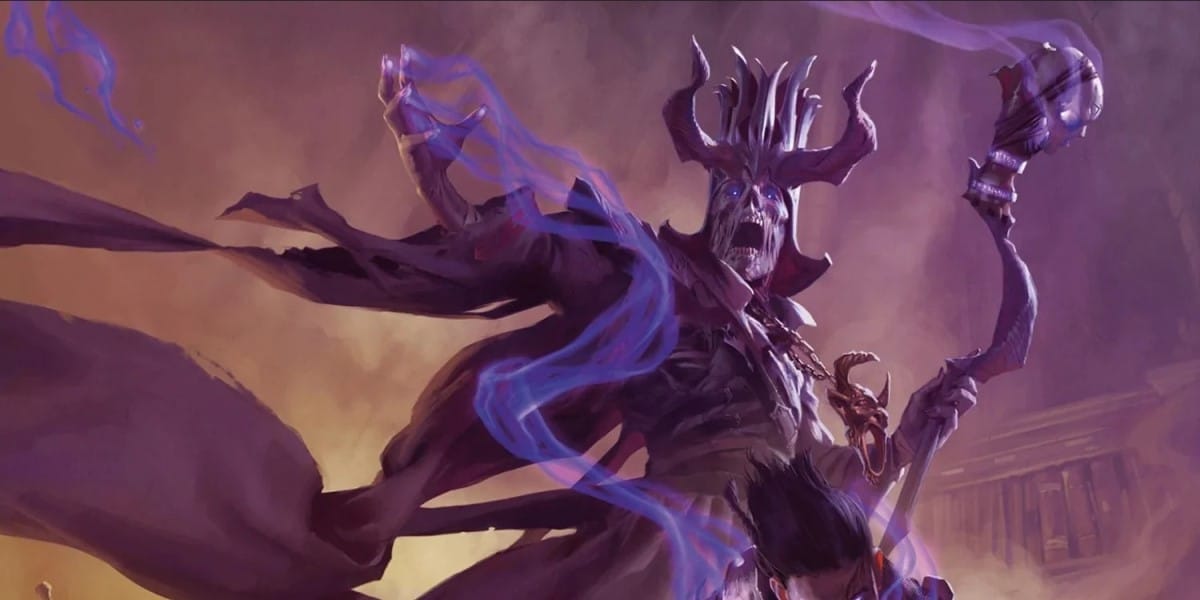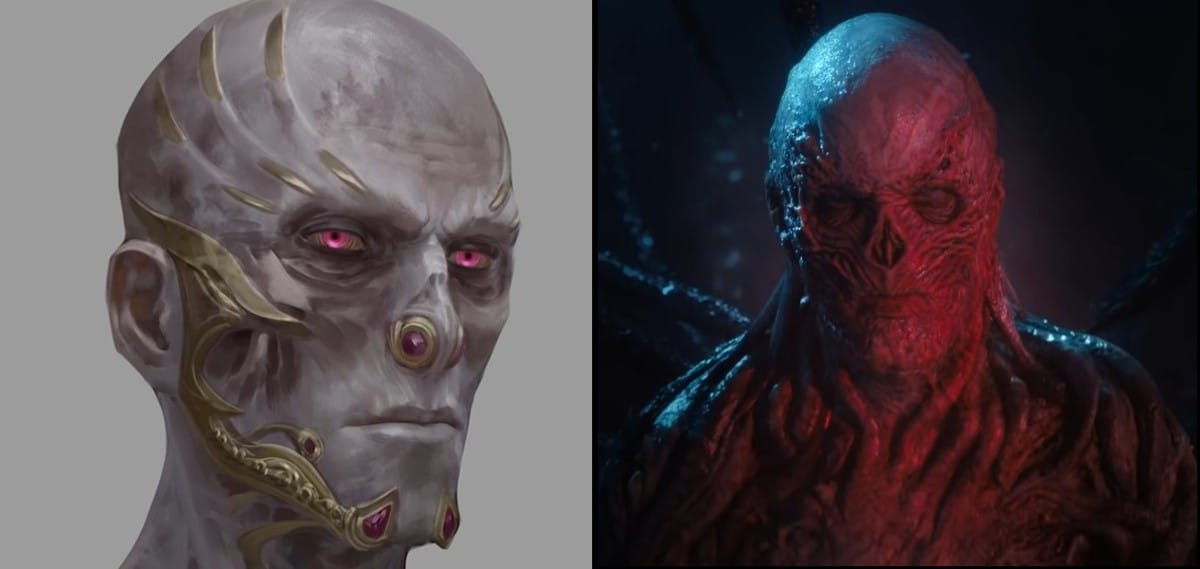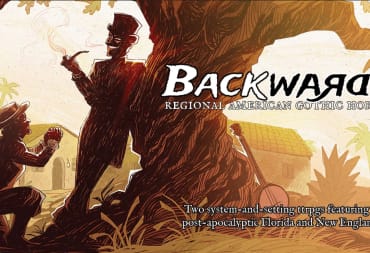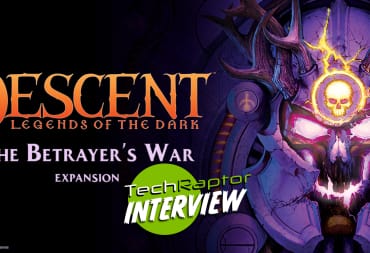In the world of Dungeons and Dragons, the lich is one of the deadliest challenges for any adventuring party. When it comes to plundering lost dungeons for treasure, disturbing a lich's lair is very likely. One of the deadliest adventures from the TTRPG's earliest days, the dreaded Tomb of Horrors, is infamously about braving a gauntlet of traps and deadly encounters set by a lich.
In fact, one of the most popular liches in the game is Vecna The Whispered One. He is a lich so influential he has become (as far as anyone else is concerned) an undead god. Artifacts bearing his name have appeared in multiple D&D adventures. He has appeared as a major antagonist in the beloved Dungeon and Dragons liveplay series, Critical Role. And now, even the newest villain in the latest season of Stranger Things bears his name.
So what exactly is it about these boney spellslingers that have made them so enduring as staples of fantasy role-playing games? Why has the cache of certain names like Vecna or Acererak endured for over forty years?
Well, we here at TechRaptor decided to reach out to Wizards of the Coast about the place liches have in their vast fantasy universe and what makes them so compelling. This lead to us having a lovely correspondence with Dungeons and Dragons Fifth Edition's Lead Designer himself, Chris Perkins.

First, what sets a lich apart from other undead in Dungeons and Dragons? Unlike vampires, zombies, or ghosts, the creation of a lich happens when a spellcaster – usually a wizard – decides to undergo a transformation for immortality. They actively choose to perform a horrendous magic ritual, the steps are kept vague for Game Masters and storytellers to fill in the gruesome details for themselves, to rip out their soul, place it into a magical box called a phylactery, and preserve their mind from rot and decay, all at the cost of their body withering away to a shell. As long as the phylactery remains intact, the lich can simply reform its body while retaining all knowledge and experience it had in life.
It is because of this functional immortality combined with the lich's obsession with knowledge that makes them so terrifying. It plays into a very primal fear of most people with academic pursuits: that desire to learn more and to ensure that knowledge is retained forever. As Perkins himself stated, “The quest for knowledge is something all great minds can appreciate, but the underlying irony is that some knowledge probably should remain hidden.”

It is that last part, the idea of knowledge that should remain hidden, that seems to characterize Dungeons and Dragons' most notable liches. The demilich Acererak, the big bad of Tomb of Annihilation, attempts to birth a new evil god by draining the souls of the recently deceased with the aid of a device he devised. Those who seek the wisdom of Vecna must find his missing eye and hand, then replace their own limbs with these mummified relics. Even more benign liches like Exethanter, librarian of the Amber Temple within the mountains of Barovia, imparted the knowledge of communing with The Dark Powers; leading to the creation of the first vampire Strahd Von Zarovich. All of this thanks to these undead scholars' centuries of unfettered archival and study.
But there is a certain tragedy to liches as well. In order for their minds to remain sharp and active, a lich must actively consume the souls of the living. If this doesn't happen, they begin to fade, their vast knowledge withering away like their bodies. There's a good chance that even after all of that sacrifice and relentless thirst for knowledge and wisdom, a lich can be doomed to an eternity of nothing else to learn.
One of the earlier liches I remember was Larloch, who lived like a hermit in the depths of a dungeon in the Forgotten Realms campaign setting. Larloch was interesting to me because, despite his immortality and great power, he couldn’t figure out a way to exist in the world of the living, so he sequestered himself in a dark sepulcher until he was all but forgotten. That’s really sad, but it says something about the lich’s paradox: power and longevity don’t actually amount to much in the end.
But by that same token, liches are highly motivated individuals. Because of that, their goals and desires can be just as diverse as any adventuring party at any gaming table. For Game Masters out there that want to embody the power and menace of a lich, these crucial questions need to be answered. What knowledge is the lich seeking? What rivals, if any, stand in their way? Perhaps, they seek the knowledge found within the Book of Vile Darkness, allegedly penned by Vecna himself? For these characters, lichdom isn't the ultimate goal, it is just another means to an end. But other than those specific details, a lich can be just about anything, as Perkins was quick to share.
After Vecna, my favorite lich is Vlaakith the Lich Queen, the supreme undead ruler of the githyanki. I wrote an adventure about her titled “The Lich Queen’s Beloved” (Dungeon magazine, issue 100). Vlaakith holds court in the city of Tu’narath, which is built on the back of a dead god in the Astral Plane. In Vlaakith, we see a lich who is leveraging her power and immortality to hold sway over a plane-spanning kingdom. She essentially has the power and influence of a god.

Alternatively, perhaps the lich isn't evil to begin with? For all of the drubbing that the Dungeons and Dragons community gave Fourth Edition, it did include some unique ideas. One of them was a special Epic Destiny certain magic-users could attain: The Archlich. You figure out the secrets of lich immortality, but without any gruesome human sacrifice or bodily mutilation. This means that good, charitable, and even altruistic liches can exist in the D&D multiverse. Perkins himself even agreed. “It’s certainly possible. I think it’s fun to have powerful spellcasting characters pursue lichdom as an epic destiny, since it leads to interesting story possibilities. “
It is with all of these traits in mind that it becomes obvious why liches are so iconic in Dungeons and Dragons. From a storytelling perspective, there is a lot of texture to come from arcane scholars that delve too deep into the mysteries of magic. As a vehicle for fantastic battles and setpieces, they are a playground for Game Masters to escalate the challenge for their players.
It's why for many players the name of Vecna, the very first lich introduced in the earliest days of Dungeons and Dragons, is associated with devlish schemes, ruthless ambition, and terrifying power. The Whispered One is as synonymous with this game as polyhedral dice, Beholders, and Gelatinous Cubes.

With that in mind, it is no surprise his name is invoked in Stranger Things. While the Netflix series created by The Duffer Brothers wears a lot of its influences on its sleeve, 1980s genre film and Stephen King to name a few, the largest one by far is Wizards of the Coast's iconic tabletop RPG. The main cast are avid players of the game, using various terms and shorthand to give an explanation to the fantastical monsters they confront. These invocations have included the terrifying Demogorgon in Season 1 as well as the possessing, personality-eroding Mind Flayer in Seasons 2 and 3. If the ultimate mind behind the terrible forces threatening the small town of Hawkins and the world were to have a name, one that feels ominous and inevitable,Vecna would fit perfectly.
In fact, the promotional material showing the show's version of Vecna bears a striking resemblance to an official redesign of the character released by Wizards of the Coast. When asked about creative collaboration with the Netflix series, Senior Creative Director of Wizards Franchise Development, Jeremy Jarvis stated the following:
The Netflix team reached out to the Wizards Franchise Development Team, which is part of Wizards of the Coast but separate from the D&D Studio that works on the Dungeons & Dragons Roleplaying Game. Stranger Things shared their unique angle on Vecna for their universe and Franchise was able to share our new design and then together look for opportunities to collaborate in exciting ways.
Considering that Wizards of the Coast have worked with Netflix on cross-promotion in the past, this means we might see more of The Upside Down's version of Vecna at our gaming tables in the future. It also means that new players at the table will have a better idea of what to expect when these skeletal mages appear in their sessions.
Have a tip, or want to point out something we missed? Leave a Comment or e-mail us at tips@techraptor.net












